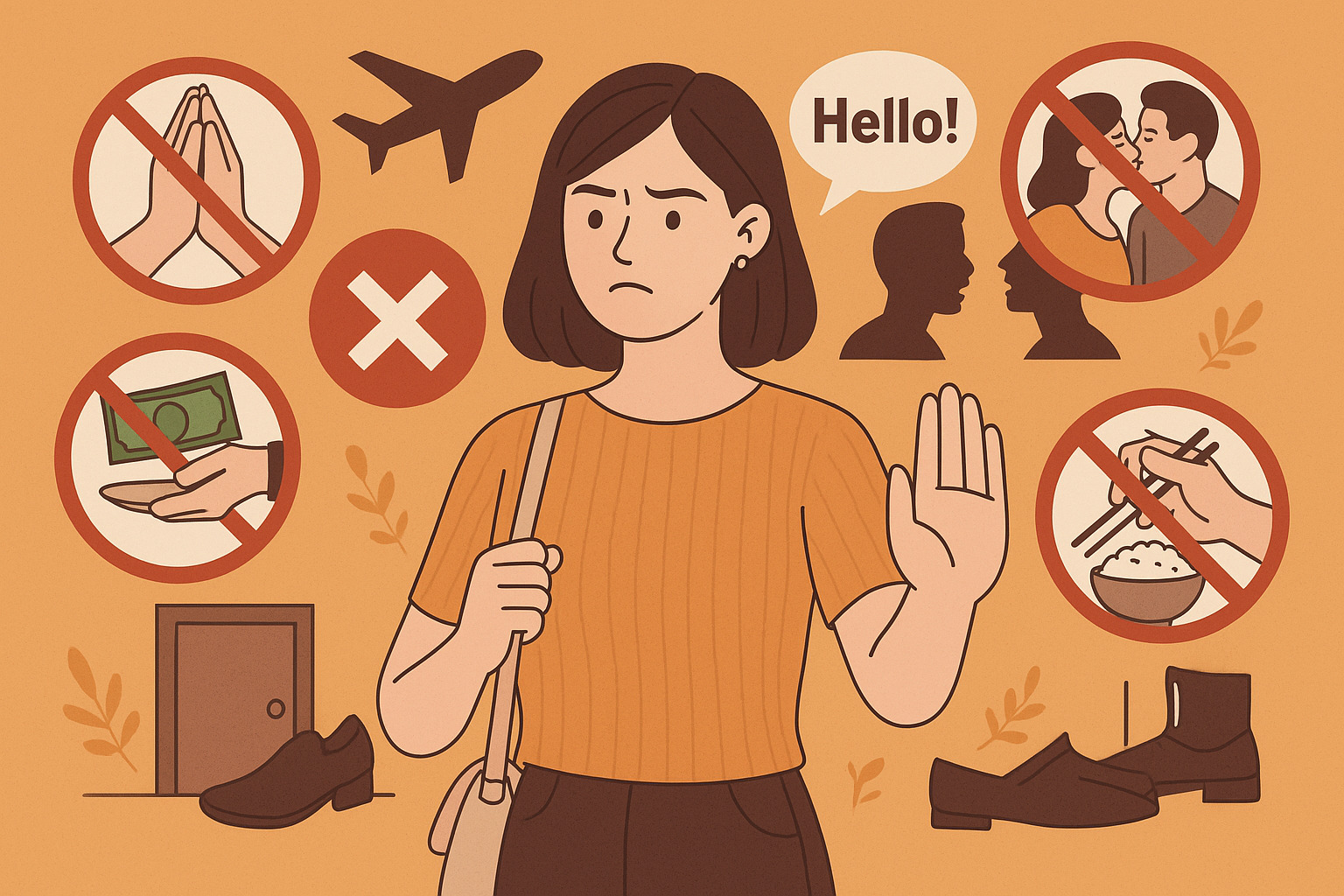Travel broadens the mind—but without local awareness, it can quickly narrow your welcome. Cultural missteps are more than awkward; they shape how locals perceive you, and not always kindly. If you’re heading abroad, here are behaviors to avoid so your presence feels respectful, not disruptive.
1. Ignoring Dress Codes
Different countries carry different expectations for attire. What feels casual and expressive in one place may be viewed as inappropriate or offensive in another.
- Middle East: Modesty is non-negotiable in public spaces. Cover shoulders, knees, and avoid tight clothing.
- Southeast Asia: Temples require respectful outfits—covered shoulders and legs are standard.
- Europe: Beachwear doesn’t belong off the sand. Wearing flip-flops and tank tops around town is frowned upon.
Always observe what locals wear and adjust. Comfort shouldn’t override context.
2. Tipping the Wrong Way
Tipping habits vary wildly. Over-tipping may seem generous but could be interpreted as patronizing. Under-tipping in some countries may signal disrespect or ignorance.
- Japan: Tipping is often seen as rude or unnecessary.
- United States: Not tipping in restaurants is considered insulting; 15–20% is the norm.
- France/Italy: A service charge is often included, but a small coin for good service is appreciated.
Research local practices before paying the bill.
3. Public Displays of Affection
Hand-holding may feel innocent to you but can be taboo in conservative cultures.
- India: Public kissing or extended embraces can draw stares or even fines.
- Middle Eastern countries: Public affection between couples—especially same-sex couples—is often illegal.
- Nordic countries: While liberal, overt displays are still rare and considered inappropriate in formal settings.
Respect social codes, even if they differ from your own.
4. Taking Photos Without Permission
That perfect shot may cost you more than social capital. In many cultures, privacy and spiritual significance are tied to place and people.
- Always ask before photographing locals—especially children, religious figures, or ceremonies.
- Avoid snapping military sites, government buildings, and airports. In some places, it’s illegal.
- If visiting religious sites, be mindful of signs restricting photography, even if others are ignoring them.
Taking a moment to ask shows respect and earns better interactions.
5. Assuming English Works Everywhere
Many travelers speak English and assume it’s universal. That assumption can offend locals or be read as laziness.
- Learn greetings, thank-yous, and basic phrases in the local language.
- Use translation apps discreetly to show effort, not dependency.
- Avoid speaking louder to make English “more understandable”—it rarely works and often frustrates.
A little effort in the local tongue goes a long way.
6. Disrespecting Mealtime Etiquette
Dining rules are deeply cultural. Misusing chopsticks, eating with the wrong hand, or refusing food outright can come off as rude.
- Japan: Never stick chopsticks vertically into rice; it’s linked to funeral rituals.
- India: The left hand is considered unclean. Eat with the right.
- France: Keep hands above the table, not in your lap. Bread is placed directly on the tablecloth, not a plate.
Also, studying food menus before arriving at a popular international chain can help avoid misunderstandings—especially if you’re sticking to familiar options across countries where these brands operate.
7. Touching or Gesturing Incorrectly
Gestures don’t translate across cultures. A simple wave or nod might be fine at home but offensive elsewhere.
- Thailand: Don’t touch anyone’s head—it’s considered sacred.
- Greece and Turkey: An open palm facing outward (like a stop gesture) is vulgar.
- Bulgaria: Nodding means “no” and shaking your head means “yes”—the opposite of what most are used to.
Observe others and keep gestures to a minimum until you understand what’s acceptable.
8. Being Loud in Public Spaces
Volume often signals respect—or lack of it. Loud talking, laughter, or phone use can irritate locals in cultures that prize quiet public behavior.
- Japan: Public transport is silent; phone calls are discouraged.
- Germany: Quiet hours in residential areas are enforced by law.
- UK: Loud conversations in museums, galleries, or historical sites will draw frowns.
Tone it down unless you’re in a lively marketplace or concert.
9. Forgetting to Remove Shoes Indoors
Not removing your shoes can seem careless or even offensive in many homes and religious spaces.
- Asia: Always remove shoes before entering a home, temple, or traditional inn.
- Scandinavia: Shoe removal is customary in most homes.
- Middle East: Shoes should be left at the door in mosques and many homes.
If you’re unsure—ask. Locals will appreciate your interest in respecting their space.
10. Assuming Cultural Similarity Based on Geography
Just because countries share a border doesn’t mean they share customs. Switzerland and France. India and Nepal. Argentina and Chile. Each holds its own norms, traditions, and taboos.
- Don’t say “It was the same in the last country I visited.”
- Avoid making comparisons unless invited.
- Let each culture stand on its own terms.
Respect is shown through observation, not assumption.
Final Thought
A respectful traveler blends in, learns quickly, and listens more than they speak. Cultural intelligence isn’t just about avoiding offense—it builds trust, opens doors, and creates meaningful connections. The effort pays off long after the passport stamps fade.
